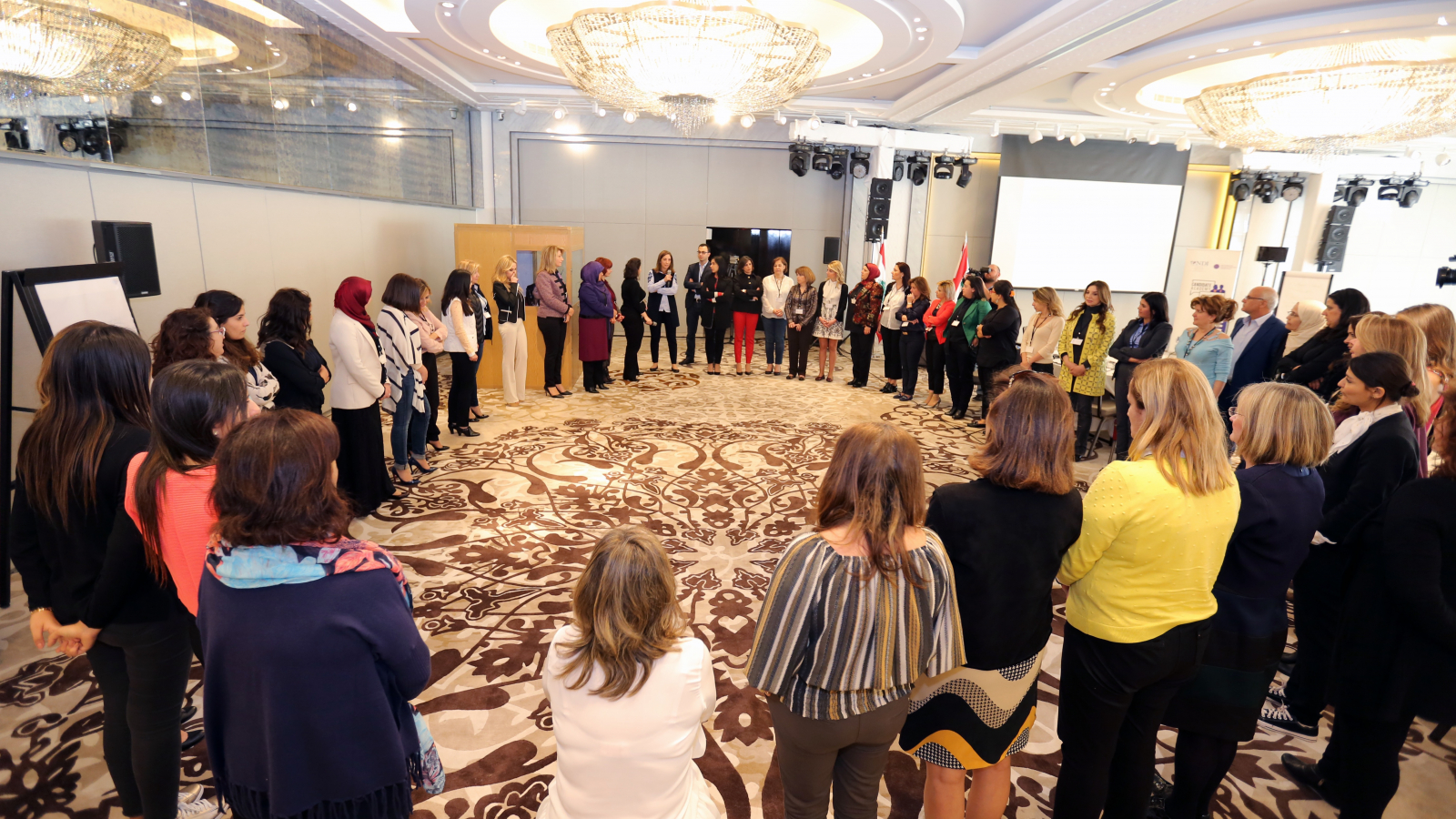
Women from throughout Lebanon gather to consider strategies to get on lists in advance of parliamentary elections at NDI's Candidate Academy.
SHARE
Lebanon is the oldest democracy in the Middle East, granting women the right to vote and run for office in 1953. So why, more than six decades later, does Lebanon have so few women in its parliament? According to the Inter-Parliamentary Union (IPU), Lebanon ranks 185 out of 193 countries surveyed with only 3 percent of women in its 128-seat parliament. This low rate is not for lack of qualified women. Women now account for more than half of university graduates in Lebanon and can be found in senior level positions in the private sector, civil society, and academic institutions.
Parliamentary elections, widely anticipated in the next year, are an opportunity to address this woeful imbalance in the political field. The National Democratic Institute (NDI), in collaboration with the Westminster Foundation for Democracy (WFD), held a boot camp for 46 potential women candidates over the first weekend in April to launch the Candidate Academy program sponsored by the British Embassy in Beirut. The program aims to provide practical skills and advice to first-time candidates seeking office in Lebanon.
Fatimazahra Barassat, recently elected to the Moroccan parliament, shared her experience overcoming social and political obstacles with Lebanese women.
The participants were representative of Lebanon’s diversity, including all of the major political parties, most of the 18 officially recognized sects and a broad base of civil society. These candidates represented multiple generations of women, ranging in age from 24 to 62. The trainers and visiting experts were almost as diverse, hailing from the United Kingdom, Morocco, Jordan, Tunisia, Canada and Lebanon.
A lively opening panel discussion set the scene as the international guests shared their experiences of the slow, steady work that it took to break through and elect more women in their own countries. A common theme was that gender quotas or other affirmative action mechanisms in election laws are an important component of increasing the numbers of elected women.
In some countries, at the current rate of progress, it would take more than three hundred years for women to reach parity in parliament. I don’t know about you, but I’m not willing to wait that long.
-Margaret Curran, a former member of the Scottish and UK parliaments
Prospective candidate shares her motivation to run, as part of a public speaking exercise.
The discussion also outlined costs of the absence of women in decision-making positions. Women Members of Parliaments (MPs) in Scotland were able to fight for and secure funding for rape crisis centers, while women in Lebanon still cannot pass on their nationality to their children. One of the main messages from all of the panelists was that persistence pays off. Many participants indicated that they were inspired by a Moroccan MP who started from very modest economic means and worked hard within her political movement, trying to run for office several times before she was elected.
Over the next two days, the participants learned about the legal framework of getting registered as a candidate in Lebanon, how to set vote targets and build strategies, as well as power mapping of influential people within their communities who have the potential to help or hurt their chances of winning the election. Next, candidates discussed possible communications strategies, were asked to develop a campaign message and to further develop that into a one-minute speech that they could use when communicating with voters.
Candidates were especially excited for the final two sessions on digital media and public speaking. While Lebanon has high usage rates on platforms such as Facebook, Twitter and Instagram, social media can be a double-edged sword in a campaign context if it is not approached with the same level of planning and preparation as any other aspect of a campaign. “Social media is a tool, not a goal,” participants were informed, “it may be free but it is not cheap in terms of time and effort if it is done right.”
Minister of Women's Affairs, Mr. Jean Ogasapian, offers keynote address encouraging women to run for office, at NDI's Candidate Academy.
In the final session of this training, all of the participants had the opportunity to practice their public speaking and receive feedback from experts through the delivery of their one-minute stump speeches. In their presentations, the women raised a range of different issues that were important to them, from the cost and quality of healthcare to the importance of sidewalks in their communities.
At the conclusion of the weekend, many participants declared they were energized and inspired by the personal stories shared by experts and by other participants. One woman from a highly conservative political party and region of South Lebanon said,
Before this workshop, I had not considered running for election, but now I think I have as much of a right as any man in my party to be on our list.


